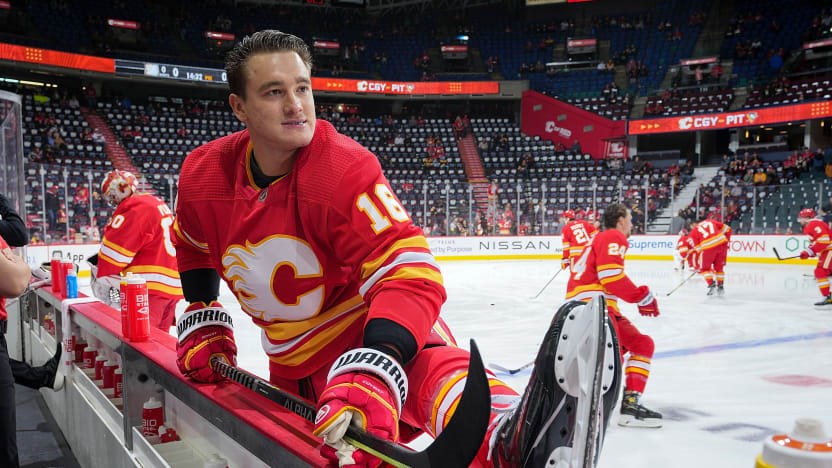The Â鶹´«Ã½Ó³»Canucks just got a whole lot bigger.
On Thursday, the Canucks bolstered their blue line with the addition of Nikita Zadorov via a trade with the Calgary Flames.Zadorov has a lot going for him, including impressive skating and mobility, but what jumps out the most is that he’s big.
Really big.
According to the NHL’s statistics, Zadorov is 6’6” and weighs in at 248 lbs, which makes his agility and mobility on the ice all the more impressive. Just one defenceman in the NHL is heavier than Zadorov: Jamie Oleksiak for the Seattle Kraken.
Zadorov joins a Canucks blue line that already boasts some big blueliners, including the tallest player in the NHL, Tyler Myers, at 6’8”. There’s also Carson Soucy at 6’5” when he returns from injury, while Ian Cole is comparatively short at 6’1” but weighs in at 225 lbs to land him among the top-25 heaviest defencemen in the NHL.
All of those hefty defencemen add up to the second-heaviest blue line in the NHL despite being led by one of the smallest defencemen in the NHL, 5’10” Quinn Hughes.
The only team heavier than the Canucks is the team they just faced on Thursday night: the Vegas Golden Knights, led by 6’6”, 240 lbs defenceman Nicolas Hague, with no smaller defencemen dragging down the averages.
You can see in the above chart how the Canucks’ top-six defencemen stack up in average height and weight against the top-six defencemen from teams around the NHL.
The Edmonton Oilers have the tallest blue line, led by the 6’7” Vincent Desharnais but they don’t have quite as much weight backing up that height.
What does it mean for the Canucks that Zadorov’s addition gives them one of the biggest blue lines in the NHL? Canucks head coach Rick Tocchet is happy, at the very least.
“I just like the big defencemen that can skate,” said Tocchet on Thursday. “[Zadorov] just fits the model that we want to have here.”
The model is clear: big defencemen who can cover a lot of ice in the defensive zone, not just with their bodies but with the length of their sticks.
“They’re long, disruptive, get sticks in lanes,” said Tocchet. “Cycle busters, they get in the cycle and knock some people down and, I’ll be honest, net front too. [Zadorov] is a much-needed, clear-the-front-of-the-net type of guy. He’ll take sticks, he’ll take bodies out of there and that’s going to help our team.”
The addition of size can come with some downsides, however. With the trade, the Canucks now have three of the players with the top-ten worst penalty differentials in the last three seasons.
Since the 2021-22 season, Ian Cole has a minus-46 penalty differential — as in, he’s taken 46 more minor penalties than he’s drawn. That’s the worst penalty differential in the entire NHL in that time.
Tyler Myers is right behind him with a minus-37 penalty differential that ranks fifth, then Nikita Zadorov is tied for seventh at minus-33. Carson Soucy isn’t far behind either at minus-27.
Fortunately, the Canucks also have a couple of forwards with the best penalty differentials over the past three seasons in Elias Pettersson (plus-65) and Conor Garland (plus-44), but the Canucks will still need to be prepared to be shorthanded a lot this season.




